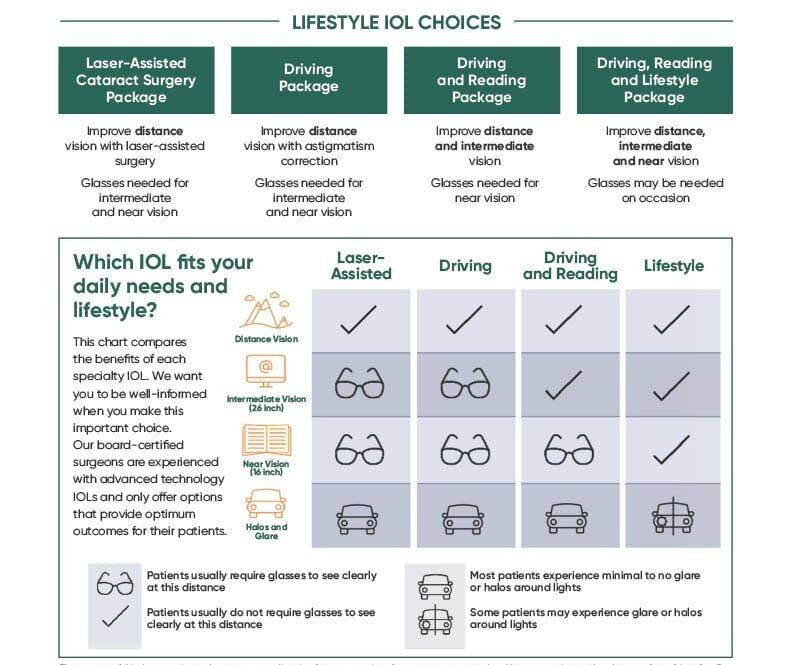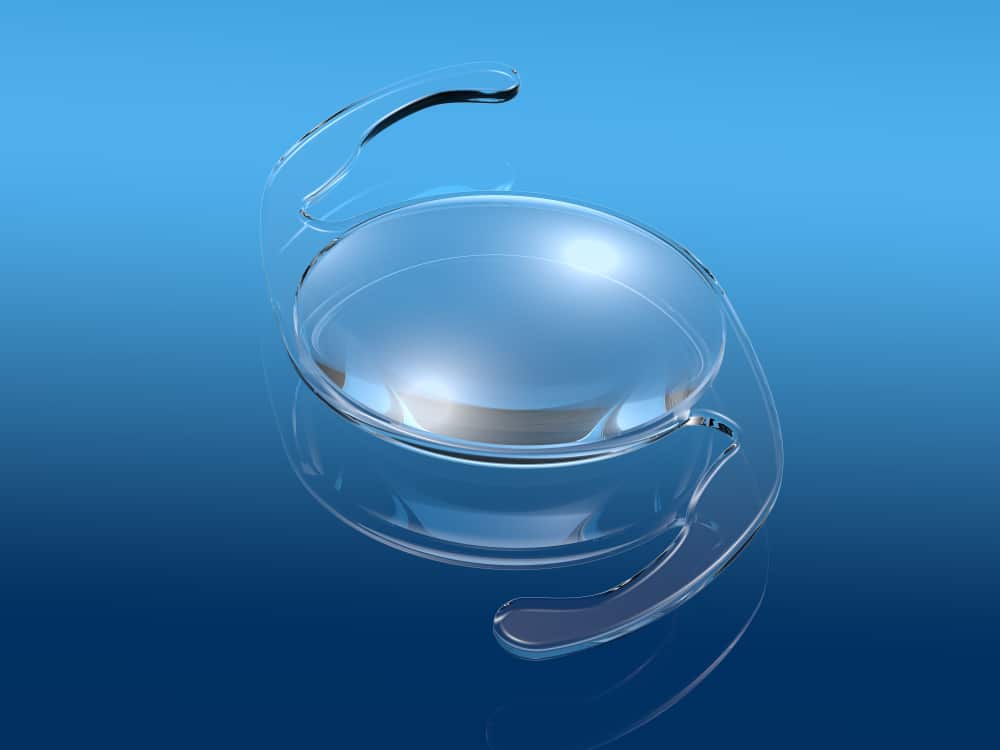Intraocular Lens (IOL) Options for Cataract Surgery
Cataract Surgery Lens Options
Surgery to treat cataracts is an outpatient procedure where an eye surgeon removes the clouded natural lens and replaces it with an artificial lens (IOL). The technology for cataract surgery is constantly improving with new intraocular lens options and the introduction of the femtosecond laser. These options can do more than just cure cataracts, they can dramatically improve vision making you less dependent on glasses or contacts.
Certain cataract intraocular lenses are not right for everyone so our team of ophthalmologists in Flint, MI and other areas such as Fenton, Lapeer, Lake Orion, Grand Blanc, and Rochester will help guide you to find the best cataract surgery lens option that fits your individual needs.
What is an Intraocular Lens (IOL)?
An intraocular lens implant is an artificial, acrylic replacement for the natural lens in your eye. Just like the natural lens, an IOL implant bends or refracts light rays inside the eye and takes over the image-focusing function in your eye.
IOL implants can be used to correct a wide range of vision problems, including myopia, hyperopia, and astigmatism, but they are most commonly used to correct vision during cataract surgery or refractive lens exchange surgery.

IOLs We Offer For Cataract Surgery
Monofocal IOLs
A monofocal IOL has one focal point and can be set to focus on close, medium, or distance vision based on your preferences. Distance vision is the most common selection. In this case, reading glasses are used for reading or seeing close up.
Multifocal or trifocal IOLs
Multifocal IOLs help you see better close up (reading distance), medium (computer distance), and in the distance. Unlike bifocals, where you have to look down to see up close, multifocal IOLs allow you to see both near and distant when looking in any direction.
Toric IOLs
Toric IOLs are used if your eye has significant astigmatism, which affects your vision at all distances, and they can be monofocal or trifocal. Prior to surgery, your surgeon will measure your eyes to determine the most beneficial toric IOL power and the specific orientation needed to correct the astigmatism.
Extended Depth-of-Focus IOLs
Extended Depth-of-Focus IOLs offer active individuals a seamless range of functional, high-quality vision, spanning from distant to near distances, with the aim of reducing reliance on glasses.
Light Adjustable Lens IOLs
The RxSight™ Light Adjustable Lens is the first and only intraocular lens (IOL) that can be customized after cataract surgery. The Light Adjustable Lens is made of a special photosensitive material that can be adjusted in response to ultraviolet (UV) light. This optimization is done by your eye doctor in the weeks following lens implantation through a series of non-invasive light treatments that take only a few minutes each.
Why Should I Consider IOL Implants?
There are multiple reasons why you may consider getting an IOL implant. If you have cataracts that are clouding your vision and making it difficult to go about your daily life, you may be considering IOL implants to remove them. During cataract surgery, the diseased lens or lenses are removed and replaced with intraocular lenses. There are a variety of cataract lenses to suit your specific needs.
IOL’s also offers an alternative for people who are not candidates for LASIK surgery.
Premium IOLs With Cataract Surgery
An IOL is primarily used during cataract surgery. Cataracts can develop in patients of any age, but they are most likely to occur in patients over the age of 60. There is a wide range of premium intraocular lenses that can be used during cataract surgery, including trifocal, multifocal, toric, and more. A Medicare ruling on lens implants allows beneficiaries to upgrade to these advanced lenses. This means Medicare covers the traditional costs associated with cataract surgery, and patients have the option to pay additional charges associated with receiving a premium lens. When deemed medically necessary, IOLs for cataract surgery can be covered by insurance minus copay, deductibles or co-insurance. However, some specialty IOL’s are considered refractive and incur an out of pocket charge.



Discuss Cataract Lens Options With a Michigan Eye Surgeon
If you’re considering IOL’s to correct myopia, hyperopia, presbyopia, astigmatism, or cataracts, consult with a trusted eye doctor at Michigan Eye Institute to find the best surgical option and type of intraocular lens for your specific needs. You can contact us online or call us at 810-484-0550 for more information, or schedule your appointment today.
Read What Our Patients Are Saying
“Michigan eye Institute is a great place to go if you have problems with your eyes. They are polite, professional and caring. The doctors and staff are very knowledgeable.”
“Always have had a good experience with the staff in the office and never have had to wait a long time! I’ve had cataract surgery and that went very well!
“Large facility with many employees but very organized and courteous. Each department is managed and run like a company within a large umbrella moving clients along each process in a timely manner. Very clean facility, hospital like setting and employees continuously wipe equipment after client use.”
“I was treated with the utmost respect and the entire staff were professional and compassionate. I felt very comfortable discussing all my concerns. I was treated like a person (friend even) and not like a number. I highly recommend this institution.”
“Every single person whether on the phone or when I’ve been there in person has been very professional, helpful and kind! I’m amazed how great the staff is! And my doctor is awesome! In a office where they have this many patients I never thought my experiences would be consistently great! It’s a well oiled machine and they keep things moving along easily for each step of the process. I’m so happy I found Michigan Eye! 10 stars!”
COME SEE US
Concerned about how laser-assisted cataract surgery works? The eye experts at Michigan Eye Institute can help you maintain your lifestyle and sustain your vision. Come see how we can improve your life.








